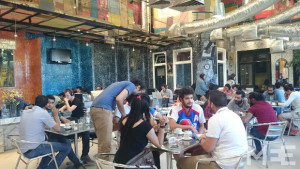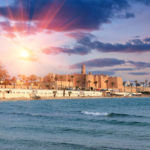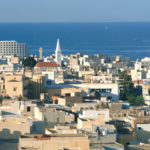The first official LGBT advocacy group and gay pride parade seem promising, but discrimination and imprisonment are still real threats.
There are about seven organisations in Tunisia that fight for the rights of the lesbian, gay, bisexual and transgender community (LGBT), but you wouldn’t know it at first glance: only one of these organisations openly presents itself as such.
“The other organisations didn’t have the courage to even try to get official recognition,” said 21-year-old law student Belhassen Azaiez with a smile, sitting in a smoky cafe in Tunis. His organisation Shams received official recognition last May as an advocacy group for sexual minorities.
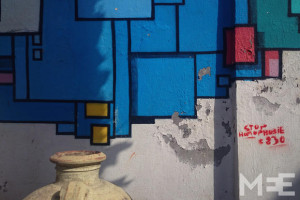 Other LGBT organisations claim to fight for human rights or for minorities in general, despite focusing exclusively on gay rights. “If we refer to ourselves as an LGBT organisation, we wouldn’t be able to do as much and it wouldn’t be safe,” explained Ramy Ayari, 22, on a terrace in one of Tunis’ “gay-friendly” cafes. (photo left: Anti-homophobia graffiti is etched onto a wall in Tunis’ Old City)
Other LGBT organisations claim to fight for human rights or for minorities in general, despite focusing exclusively on gay rights. “If we refer to ourselves as an LGBT organisation, we wouldn’t be able to do as much and it wouldn’t be safe,” explained Ramy Ayari, 22, on a terrace in one of Tunis’ “gay-friendly” cafes. (photo left: Anti-homophobia graffiti is etched onto a wall in Tunis’ Old City)
The computer science student is an active member of Without Restrictions, another gay rights organisation. “During the dictatorship there was little you could do. It was almost impossible to set up organisations,” he said.
Shortly after the Jasmine Revolution of 2011, there was an explosion of new organisations advocating against issues such as pollution and torture and for women’s rights. Following the implementation of a new law, it finally became possible to establish official organisations for these and other causes. The LGBT community embraced this opportunity with open arms.
As a teenager, Azaiez did not know any other gay people, and LGBT organisations did not yet exist in Tunisia. “I locked myself in my room and fell into a severe depression. I’m an activist now because I don’t want others to go through the same.”
The advocacy groups, most of which operate in the capital city, use social media to help the LGBT community with problems, inform them of their rights and fight discrimination. This is no easy task; according to the activists, the vast majority of the Tunisian population is homophobic. During a television interview, the former minister for human rights, Samir Dilou, referred to homosexuality as a “perversion that should be treated medically”.
The organisations also fight for the abolishment of Article 230 of the Tunisian Penal Code, which prohibits homosexual relations. With this in mind, you might wonder why Shams was recognised under Tunisian law. “Having sex with someone of the same sex is forbidden,” Azaiez explained, “but to be part of a sexual minority is not”.
The advocacy groups emphasise different areas and try to achieve their goals in different ways. “It is a good that there are more organisations,” said Ali Bousselmi, 26, from the organisation Mawjoudin (We Exist). “It would be easier for the government to stop us if there was just one organisation.”
“I’m lucky, my parents are open-minded,” he added, speaking from his family house in the Old City of Tunis. Although Bousselmi has previously volunteered for Amnesty International in Tunisia, as with other civil rights organisations in the country, there was no room for LGBT issues at the time. (photo left: Etoile du Nord is a ‘gay-friendly’ cafe in central Tunis (MEE/Thessa Lageman)
Threatened by Salafis
A lot of media attention followed the recognition of Shams, and the LGBT community received a great deal of critique and negative responses. The organisation Progression des Jeunes Tunisiens and also Tunisia’s religious leader, the Mufti Hamda Said, demanded that the government dismantle the recognition, claiming it threatened the values of Islam and the principles of Tunisian society.
“We encourage media appearances because hiding makes you more afraid and weaker,” explained Azaiez, the law student. During a television programme, another member of Shams claimed that 40 percent of the Tunisian population was gay. Afterwards, he was threatened by Salafists who demanded that he be beheaded. His father was approached in his cafe and was told that he should kill his son. The family was eventually forced to move to another house in Hammamet, a coastal town some 40 kilometres from Tunis, while the young man moved in with a friend in the capital.
“That wasn’t very smart,” said Azaiez, who himself received several threats on Facebook afterwards. “I invited those people to have a chat and met a few of them in a cafe. At the end they still thought I was going to hell, but at least they were prepared to listen to me.”
Other LGBT activists were not pleased with the attention. Afterwards several people were threatened and beaten in the southern cities of Sfax and Gabes. “Unfortunately after all the commotion, the politician who promised to discuss Article 230 in parliament told us the timing wasn’t right,” said Bousselmi. “We and other activists decided to lay low for a while,” added Ayari from Without Restrictions. “It’s too dangerous to organise anything right now.”
Gay pride
The past six months have been tumultuous for Tunisia’s LGBT community. In March a gay pride festival was held, perhaps for the first time ever in this North African country. The modest multi-day event took place at a university campus in Tunis.
“We took a rainbow umbrella,” recounted Ayari, “and signs with texts like ‘Love is not a crime,’ and ‘My body, my sexuality, my right’. Most passers-by looked puzzled.” (photo left: ‘Love is not a crime’ is painted on a wall in Arabic in La Marsa (MEE/Thessa Lageman)
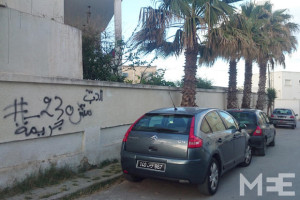 Azaiez was present as well. “Someone asked me what the rainbow flag means. I explained it and he asked if I was one of them. I told him I was and he left without saying a word.”
Azaiez was present as well. “Someone asked me what the rainbow flag means. I explained it and he asked if I was one of them. I told him I was and he left without saying a word.”Bousselmi also attended the event. “At the end, Islamists and people from left-wing student organisations came to bother us. They told is we should leave and that what we do is against nature.”
On 17 May, the International Day Against Homophobia, several activities were organised by the LGBT community in Tunis as well. Chouf, which fights for the rights of women who belong to a sexual minority, organised a festival that was very well attended. For security reasons, it was called a feminist art festival and the location, in the chic and liberal neighbourhood of Carthage, a suburb of Tunis, was chosen carefully.
According to Ramy Ayari and other activists, the police tap their phone calls. “When that happens, you suddenly hear other sounds on the line,” he said, adding that he sometimes notices log-in attempts on his Facebook account from a city he has never visited.
He showed a Facebook message he received a few days earlier. The message, which contains a variety of obscene threats, was written by someone wearing a police uniform. “I blocked him immediately,” Ayari said with a sigh. 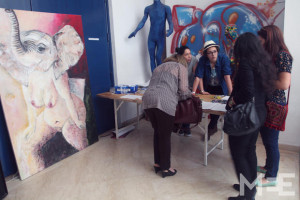 “I’d notify the police, if there weren’t so many homophobes working there.” (photo left: A ‘feminist art festival’ is held in Carthage, a Tunis suburb, on 17 May, the International Day Against Homophobia (MEE/Thessa Lageman)
“I’d notify the police, if there weren’t so many homophobes working there.” (photo left: A ‘feminist art festival’ is held in Carthage, a Tunis suburb, on 17 May, the International Day Against Homophobia (MEE/Thessa Lageman)
Prison
A Swedish and a Tunisian man were jailed in February for committing “homosexual acts”. The Swedish man has since been released, but the Tunisian man is still in custody. Often, the police attempt to set people up or neighbours expose them as homosexuals. The circumstances in prison are atrocious, with gay prisoners often becoming the victims of rape and contracting HIV.
Ali Bousselmi has been busy trying to find out how many gay people are currently imprisoned in Tunisia, but has yet to succeed. “In recent months several members of the LGBT community have been arrested, about seven in total,” he said. “I wonder why so many are being arrested right now.”
Another of his goals is to create a “safe house” for the LGBT community. Money is not the biggest obstacle, as he may be able to draw on foreign funds, nor are hardline Muslims. “The biggest threat,” he said, “is the police”.
He thinks people will take the risk and come anyway, because many people feel the need to discuss the problems they face, such as forced marriage and feeling unaccepted by society. “Suicide is a real problem,” he added.
Without Restrictions is also making plans to rent a building to offer a temporary home to people who were kicked out of their family homes after opening up about their sexuality. “These people often become homeless and some are forced into prostitution in order to survive,” explained Ayari.
But for all the changes, the Tunisian activists know they have a long way to go. “We need to fight for our rights,” said Ayari. “Otherwise nothing will change. Isn’t that what happened in other parts of the world as well?”
– See more at: http://www.middleeasteye.net/in-depth/features/tunisian-lgbt-community-making-strides-1659133734#sthash.yzq5KGuy.dpuf

